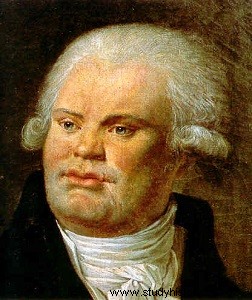
(Arcis-sur-Aube, 1759 - Paris, 1794.) Politician, one of the most outstanding and controversial figures of the French Revolution, great patriot for some, venal politician for others.
Son of a prosecutor in the bailiwick of Arcis, he completed his law studies in Paris, and joined the bar of the capital. A needy lawyer in his early days, he then enjoyed a more comfortable period thanks to his marriage, his wife's dowry allowing him to buy a position as a lawyer. He threw himself enthusiastically into the revolutionary movement in 1789, chaired the Cordeliers district, before founding the Club of the same name in 1790.
Tall in stature, with a powerful voice, features irregular and marked by smallpox, Danton becomes one of the most listened to orators, first of the Cordeliers, then of the Parisian people.
A member of the Paris Commune in January 1790, he showed himself at this time to be quite moderate, to the point that some would later accuse him of having received funds from the English, the royal family, or the Duke of Orléans. This suspicion of venality will always pursue him. It is certain that he lived in comfort and treated his friends generously in 1792, when he was no longer working.
Member of the directory of the department of Paris, that is to say say of the departmental administration, in January 1791, he displays republican feelings after the flight to Varennes, demands with the Cordeliers the forfeiture and the trial of the king (July 16, 1791). He must then leave Paris for his property in Arcis, then for England. On his return, he stood in vain for the elections for the Legislative Assembly, but was elected deputy prosecutor of the Paris Commune in December, and therefore played a role of primary importance in the course of the Revolution. /P>
He prepares the day of August 10, during which the forfeiture of the king is proclaimed, and will be appointed Minister of Justice the next day. Sitting both on the Executive Council, which he actually led, and on the insurrectionary commune, Danton knew how to keep his cool in the face of the Prussian invasion, prevented the government from leaving Paris for the Loire, sent commissioners to the provinces tasked with galvanizing energies and raising volunteers, had 3,000 suspects arrested in Paris. more daring! always daring! The same day the September massacres began, for which his enemies later reproached him:if he did not take the initiative, he did not try to stop them.
Meanwhile, outside, the tribune negotiates with England, to try to obtain its neutrality, and tries to detach Prussia from Austria. Sent to the Convention by the voters of Paris (September), he became one of the leaders of the left but, attacked by the Girondins* on his financial management at the beginning of October, he had to give up the Ministry of Justice.
Danton votes for the death of the king, then binds himself with Dumouriez during a mission to the army of the North, and on his return proposes the raising of 300,000 men and the creation of the Revolutionary Tribunal in March 1793. He broke definitively with the moderates after the betrayal of Dumouriez, attacked the Girondins and contributed to the creation of the Committee of Public Safety, which he chaired from April to July.
In foreign policy, he continues to negotiate with the enemy to try to dissolve the coalition, but he does not manage, inside, to reduce the high cost of living, nor to put an end to the Vendée and federalist insurrection. :he left the Committee of Public Safety in July. He then just remarried, his first wife having died, and left politics for a while, then Paris to retire to Arcis. Like Robespierre, at the end of the year he opposed the dechristianization advocated by Hébert and his friends, while considering the religion of the Supreme Being as nonsense. On the other hand, he opposes Robespierre on the subject of the Terror, of which he no longer sees the usefulness and calls for its suppression. With his friends, those who are called the Indulgents, like Desmoulins, convinced that peace is the only way to put an end to the Terror and to finally apply the Constitution of 1793, Danton undertakes new negotiations with the enemy.
These plots hinder the policy desired by Robespierre and the Committee of Public Safety who, to get rid of the Indulgents, will mix their cause with that of the Fripons, compromised in the scandal of the liquidation of the Compagnie des Indes. Indicted by Saint-Just, arrested on March 30 with his friends Camille Desmoulins, Hérault de Séchelles and Fabre d'Églantine, Danton was tried by the Revolutionary Court from April 2 to 4.
Le first day of the trial, to President Herman who asks him to indicate his residence, he replies:u My residence? Soon in nothingness, then in the pantheon of history! »
And, on April 4, learning that the Convention had listened to Saint-Just, believed in the conspiracy of the prisons, and voted unanimously for a decree which in fact deprived the accused of speech “Infamous Robespierre! the scaffold demands you! You will not enjoy impunity! You follow me, Robespierre! Condemned to death on April 5, and the verdict rendered without his presence because the public prosecutor, Fouquier-Tinville, had the accused evacuated who wanted to defend themselves, he climbed the scaffold the same day, the last of the "batch", after having declared to the executioner:"You will show my head to the people, it is worth it.
